Early in the first episode of the television crime show “Besa,” a car full of Albanian gangsters cruises through the streets of Ulcinj, Montenegro, singing along to the song “Krejt shokt e mi” by Ledri Vula, one of Kosovo’s biggest rappers. If this was not the first time Albanian rap music was broadcast on Serbian primetime television, it seems likely it was at least Ledri Vula’s first time gracing the Serbian airwaves.
Besa, which premiered in 2018 and whose second season came out in 2021, is a show of many firsts.
While the show’s promotional material highlights the international cast — actors from all over former Yugoslavia, as well as Italy, Estonia and more — what’s most distinct is that a show on Serbian state-owned television has as its most popular and vibrant characters a number of Albanian actors from Kosovo.
According to Tea Korolija, the show’s producer, “before Besa you didn’t have one single show in Serbia with Albanian actors. We were the first.” Even taking Yugoslav cinematic history into account, hardly any major productions ever put so many Albanian and Serbian actors together in the same place. In season one around 30% of the dialogue is in Albanian and in season two, 40%.
Airing on Klan Kosova, one of Kosovo’s largest private TV networks, it is also the first Serbian production on a mainstream Albanian-language channel in years, Klan Kosova’s programming director Alaudin Hamiti said over a Zoom conversation. “Not just on Klan Kosova,” he said, “but even on other channels in Kosovo from the post-war period.”
The family crime saga has become a sensation across former Yugoslavia and in the diaspora — a rare cultural product from the region that manages to be a commercial success in both Belgrade and Prishtina. Where Scandinavian noir has become a globally recognized cultural brand in the world of prestige TV, Besa makes a bid for a new sub-genre: Balkan noir. But how do you convince some of the top Albanian actors in the world to play drug lords in a Serbian TV show? And can such a show ever overcome stereotypes and cliches, or did it, in this case, only reinforce them?
***
At the center of the show is Uroš Perić (Radivoje Bukvić), an ordinary family man from Belgrade with a wife, two kids and a small struggling pharmaceutical distribution company.
One unlucky day, while delivering a shipment to Ulcinj, he ends up in a car accident in which the other driver dies. He soon learns she was the daughter of Dardan Berisha, the biggest heroin trafficker in the Balkans. From here, it’s all downhill for Uroš.
Dardan (Arben Bajraktaraj) plans to have the family man murdered in revenge, before deciding instead to force Uroš to become an assassin for the Berisha clan. “You took blood, now you will give blood,” Dardan says.
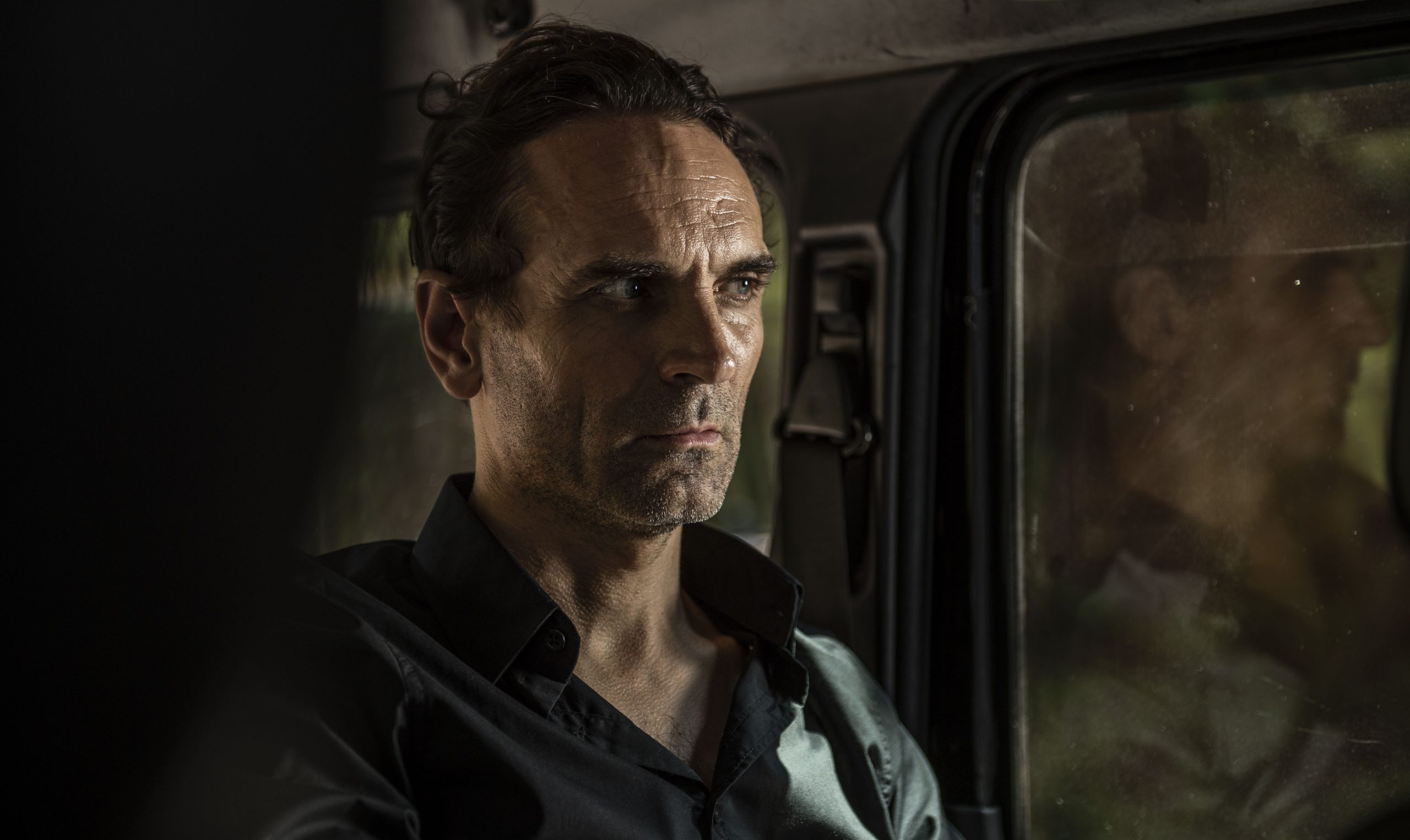
Dardan Berisha is a cold-blooded criminal, but the life he leads isn’t one he chose. Photo: Aleksandar Letić.
But in a moment of quick thinking, Uroš extracts from Dardan a besa, a “word of honor” that if broken results in “certain death,” as two Interpol inspectors from the Balkans describe the “Albanian cultural precept” to their confused French colleagues in the first episode. As long as Uroš completes five contract killings for the Berisha clan, this particular besa goes, Dardan swears Uroš’s family won’t be touched.
Filling out the dramatic triangle at the center of the show is inspector Petrit Koci, played by veteran actor Miloš Timotijević, who has recently become one of the leading men of Serbian cinema. Petrit, with his Kosovar Albanian father and Serbian mother, is between cultures, “a man who doesn’t belong to anyone or anywhere,” as Timotijević has described him. Working for Interpol out of its Belgrade office, Petrit faces constant ethnic slurs and slights from the Serbian police officers with whom he must collaborate.
When we first see Petrit, he is exercising furiously in his sparsely furnished New Belgrade apartment. The only decoration is a wall covered in mugshots, crime scene photos and newspaper clippings from which we learn that Petrit’s father was a Yugoslav police officer who was murdered by the Berisha clan in the early 1980s. It is a plot point that comes up repeatedly but is never really elaborated on in any depth.
The advertisements for the show’s premiere summed up the first season’s theme: “What are you ready to do to protect your family?” Viewers are encouraged to see themselves in Uroš’s struggle to save his family, but as the show’s creators learned as the series progressed, viewers didn’t find much to identify with in a character who suddenly transforms from a family man into a skilled assassin.
But the theme extends to other characters in more gripping ways. Uroš’s wife, Marija, is disgusted and disturbed when she learns what Uroš has done, but is soon enough lying to the police to protect him. Though Petrit has no family left to save, he is obsessed with locking up Dardan to get his revenge on the Berisha clan, and he’ll break any rules or regulations that stand in his way.
The storylines following the Albanian characters’ struggles to “save their families” quickly become the most captivating, partly due to their phenomenal acting.
Though Dardan is a cold-blooded criminal, we learn that the life he leads wasn’t one he chose. He was married off to Teuta — a daughter of the Berisha’s main rivals, the Sokoli crime family — as part of a brokered peace and now leads the clan dutifully as he tries to establish his children in a world outside crime.
Teuta, played with stoic grace by Gresa Pallaska, quietly fights the traditional role she’s been forced into, but at the end of season one she commits a shocking murder in response to an attempt on her son Driton’s life.
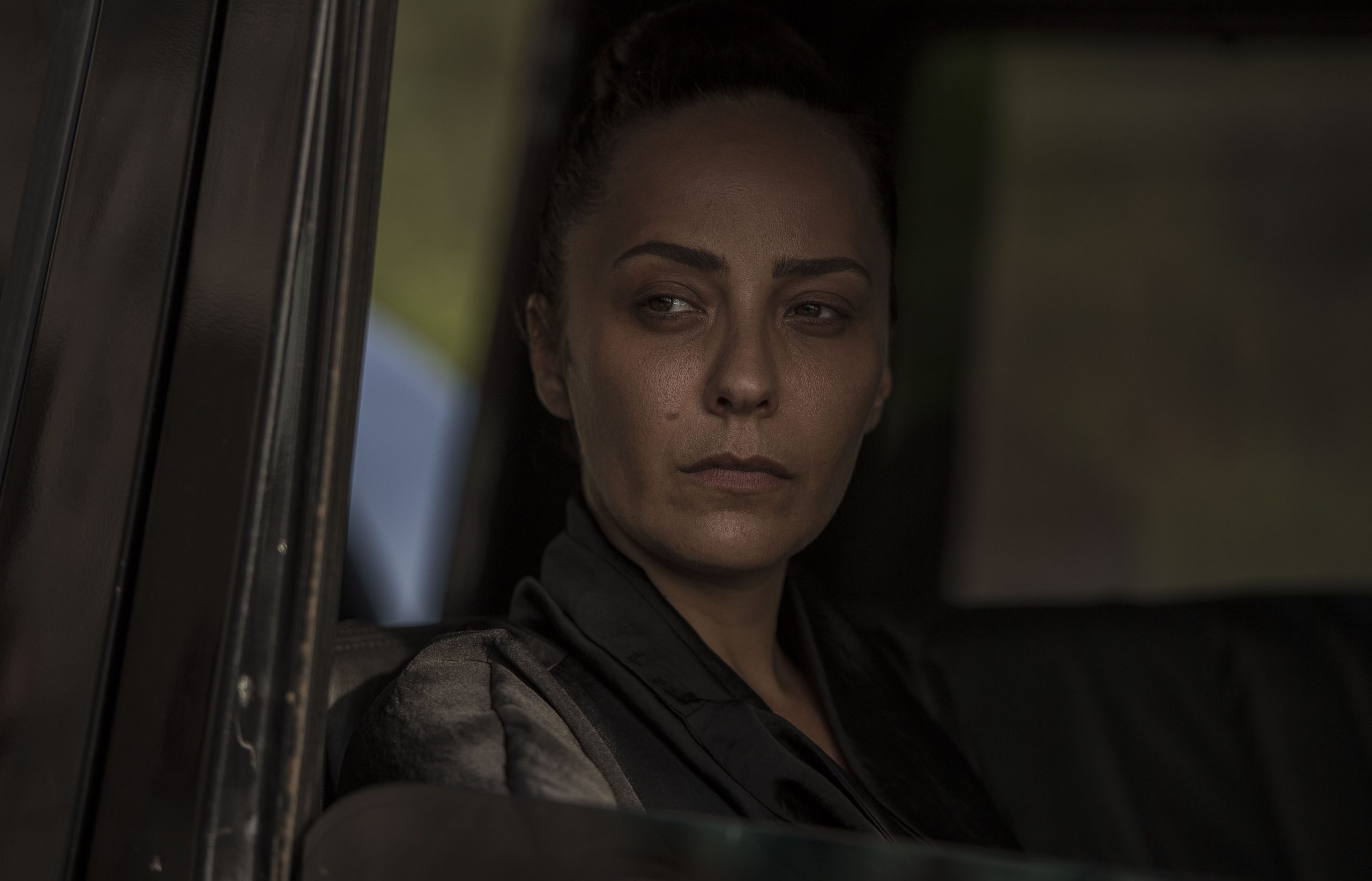
Gresa Pallaska’s character Teuta was the most popular female character for the Serbian audience. Photo: Aleksandar Letić.
Dardan’s top lieutenant Hashim, played with a feral energy by Mensur Safqiu, we learn has a secret child with a young Montenegrin girl, the family of whom he was supposed to kill on Berisha business. His devotion to his wife and daughter will lead him to break his besa to Dardan, with predictable results (“certain death”).
It’s these characters and the actors who play them, Bajraktaraj, Pallaska and Safqiu, who made the biggest impression on Serbian viewers. Producer Tea Korolija, in a joint Zoom conversation alongside the show’s creator Igor Stoimenov, said that according to audience surveys, “[Teuta] was the most popular female character in Besa for the Serbian audience.
“We didn’t expect that at all,” Korolija said. “We thought that [Uroš’s wife] Marija is going to be the main character and the most popular character.” Stoimenov added that Pallaska told him she now has more Instagram followers in Serbia than in Kosovo.
Mensur Safqiu, a leading man in the Albanian acting world, has also blown up regionally due to Besa. Stoimenov said he often meets up with Safqiu in North Macedonia and that in the past, “when you walked with Mensur through Skopje, you could tell exactly which guy is Albanian and which is Macedonian because all the Albanians, they come up and say ‘Mensur! Let’s take a picture!’”
But after Besa everyone wants pictures with Safqiu, Stoimenov said, and “in Macedonia you cannot recognize anymore who is Albanian and who is Macedonian.”
There’s a history of Albanian actors being recognized and praised across former Yugoslavia. Bekim Fehmiu and Faruk Begolli, both from Kosovo, were not only the most celebrated Albanian actors in Yugoslavia, they were among the most famous Yugoslav actors of any ethnicity. But these actors’ famous performances were predominantly in Serbo-Croatian.
The performances of Bajraktaraj, Pallaska, Safqiu and other Albanian actors from Besa represent the first time actors performing in Albanian have garnered this level of fandom in mainstream culture in places like Belgrade or Skopje, Montenegro or Croatia.
***
The Serbian press covers Besa assiduously, befitting its mass popularity, but much of the coverage is superficial, rarely rising above the level of celebrity coverage and ignoring what makes the show unique or even potentially controversial.
“I would love for this show to open a discussion about the relationship between Serbs and Albanians,” Stoimenov said. “But this is not the case. Nobody cares about that aspect, and I’m not happy because of that.
“The only thing about this show, why it was accepted in Serbia, is the quality,” he said, a quality that has garnered the show a number of awards.
At the 2019 FEDIS festival — where TV shows from Serbia, Bosnia and Herzegovina, Montenegro and Croatia compete — it won awards for best series, best music and best photography. At the upcoming Sarajevo Film Festival it has been nominated for seven awards, including for best drama series, best main actor (Arben Bajraktaraj) and “star on the rise” (Florist Bajgora, who plays Driton Berisha in season two).
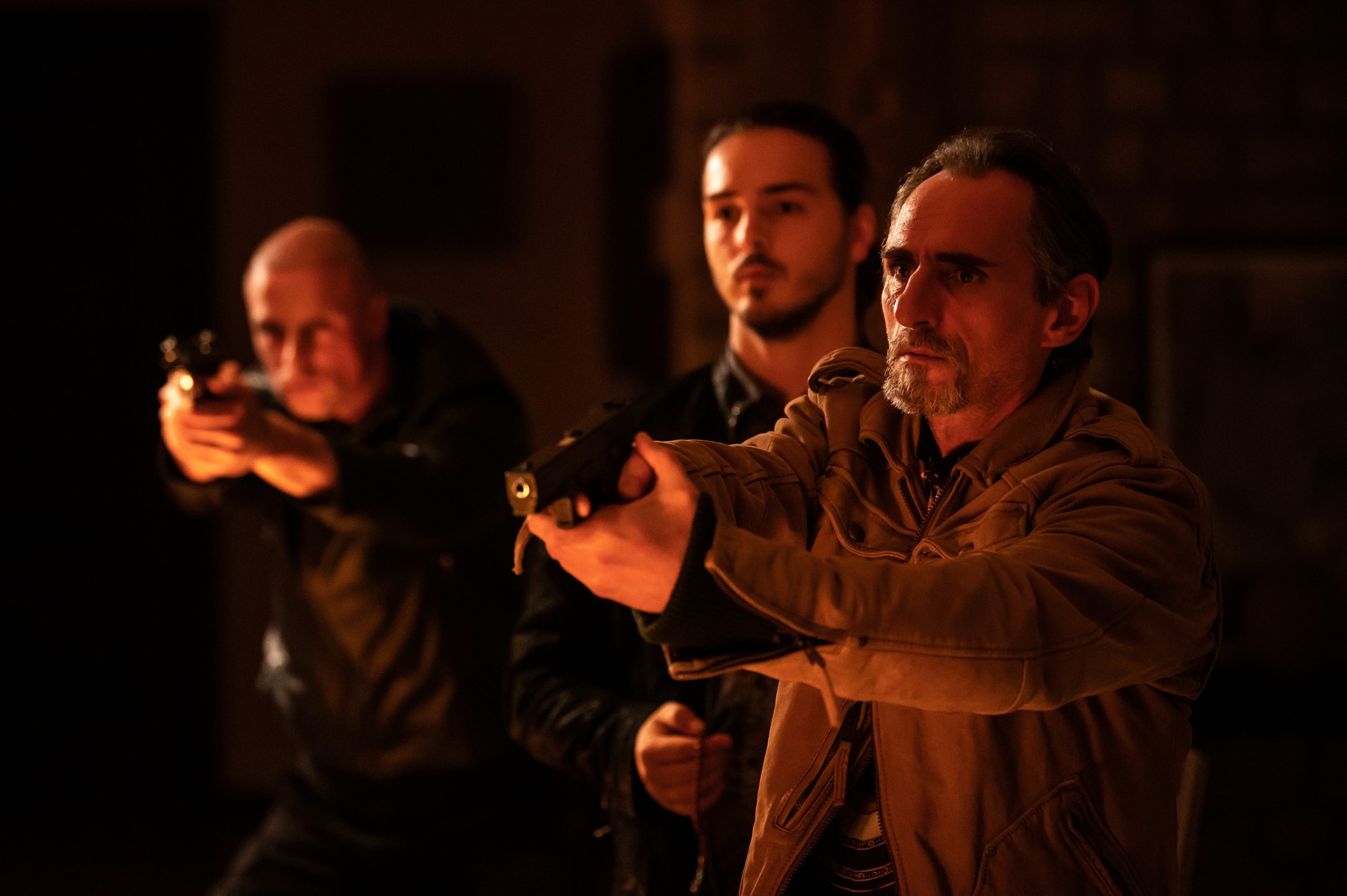
After Besa, Kosovar Albanian actor Mensur Safqiu is mobbed for photos in North Macedonia and Serbia. Photo: Sergej Radović.
The show’s popularity was what drew Relja Popović, one of Serbia’s most popular rappers, back into acting. In the second season he plays a supporting role as one of the Sokoli clan’s men in Belgrade. “I’m a bit immodest when I call it the best series, but that’s really what I think, so I finally accepted an acting role after 10 years,” said Popović.
“I would have accepted this role even without reading the script because I’m a fan of the series,” he said. Popović last acted in the award-winning 2011 Serbian film “Parada,” and his lead role in the 2009 film “Ordinary People” drew praise at Cannes and other festivals.
Part of what makes Besa stand out from other regional productions is that it was, according to Korolija, the first in the post-Yugoslav space to benefit from top-level international co-production. British screenwriter and producer Tony Jordan, who has behind him hit British shows like “Hustle” and “Death in Paradise,” was a creator of Besa and instrumental to its conception and structure.
In an interview with Drama Quarterly, Jordan said his focus was on a story that could be sold for streaming or remake rights globally. “We want international sales,” he’s quoted as saying, “not a one-off art movie or something specific for the region.”
It has since become the first Serbian TV series to sell international remake rights. An Arabic-language version is being made in co-production by studios from Lebanon and Dubai.
The Balkan end of the production team was eager to use Jordan to help push the level of the show. “When we started with Besa in 2016, we didn’t know anything about high-class series,” Stoimenov said. “Nobody knew anything.”
Korolija added that, “Before Besa you had in our market only one show that was at a high production quality, ‘Ubice mog oca’ [‘The Murderers of My Father’]. And before that we had only sitcoms or daily series. Very, very cheap production. At the time, commercial channels in Serbia could not pay for more.”
They first invested in the writers’ room, going over scripts for months and employing twice as many writers as was normal in Serbia. The actors felt the difference. Timotijević noted in particular the intensive casting process for Besa, which lasted months. “Here in Serbia, mostly they do not do castings at all,” he said. “They just go, ‘eh, this guy, that guy, this guy.’”
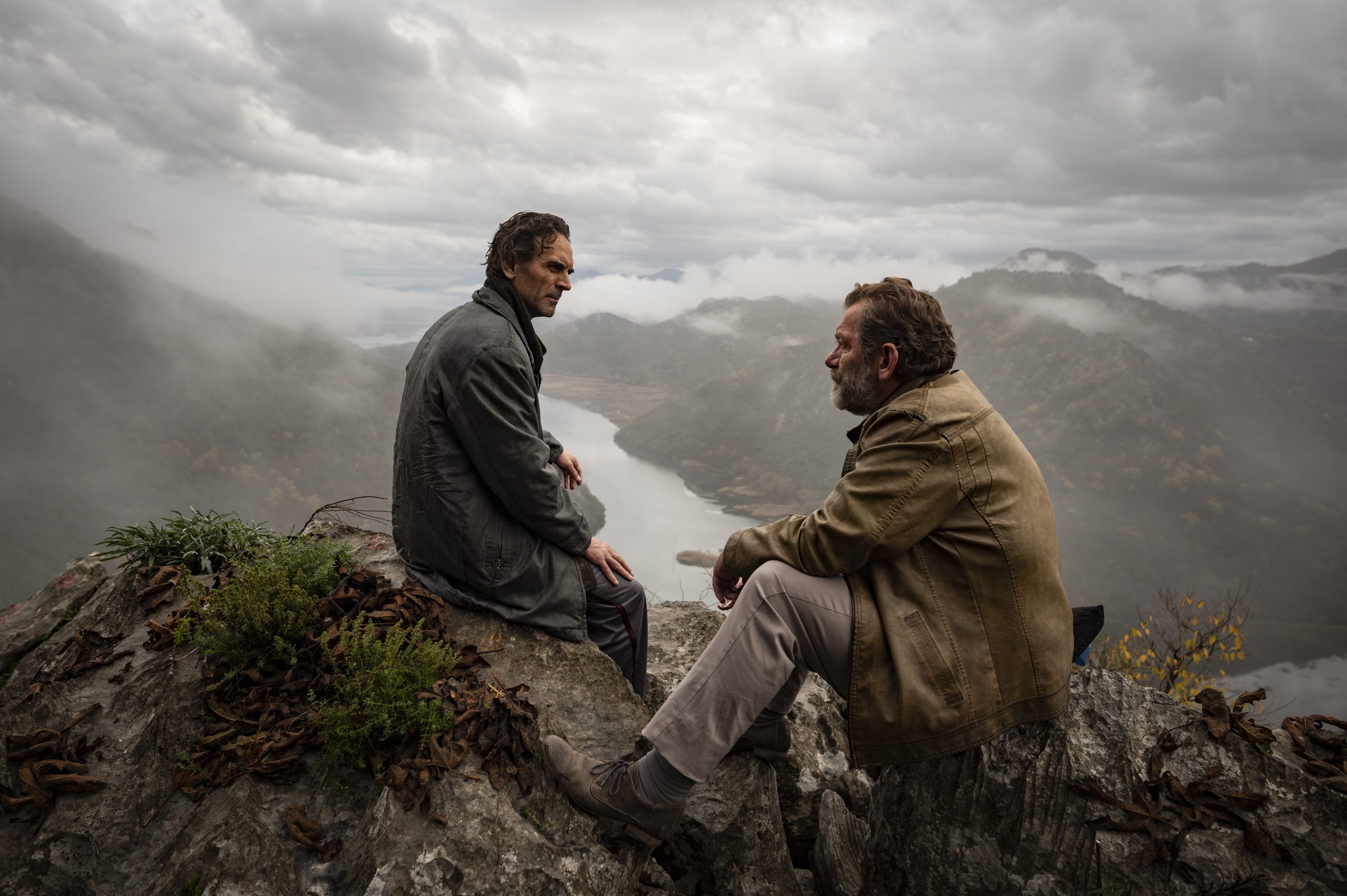
Dardan and Isa, played by Arben Bajraktaraj and Refet Abazi, may be criminals, but they operate on a code of honor. Photo: Sergej Radović.
Judging by the audience’s enthusiasm, the investment appears to have paid off. Arben Bajraktaraj, who’s famous for roles in “Taken,” Harry Potter and a number of European film and TV productions, said over a Zoom conversation, “I had people writing to me from Norway, Germany, Switzerland. They just adore [Besa].
“I was filming in the Old Bazaar in Skopje in November and I couldn’t go two meters… even in the morning with my hair like Einstein, a father came up with his daughter and said, ‘let’s talk with Uncle Dardan,’” Bajraktaraj said.
“Then the other day there were people who stopped me for Besa on my street in Paris, and I thought, ‘oh shit, now this is too much,’” he laughed. “They were people from the diaspora, I think they were from Bosnia, judging from their accent.”
Timotijević has had similar experiences. “I remember people in the market starting to ask me, ‘Besa is a really good TV show, are you doing a second season?’” he said. “And then when the second season started I received Instagram messages from Montenegro, from Macedonia, from Croatia, from Slovenia, and of course from Serbia.”
In Kosovo too, the show performed at the top of its time slot for Klan Kosova, programming director Hamiti said.
***
By the end of season one (spoilers ahead), the three main characters are trapped in a triangle of death. Dardan has barely survived an assassination attempt organized by Agim, Teuta’s brother and the leader of the Sokoli clan. In the shooting, Dardan’s teen son Driton is shot in the jaw. Though Teuta is largely unconcerned about her husband, who treats her more as an inconvenient business partner than a wife, she loses her mind at the near murder of her son and flies to Switzerland where she shoots her brother and then herself.
After losing his daughter and wife, and nearly losing his oldest son, Dardan is at a loss. He implies he might just disappear and leave the life he lives behind.
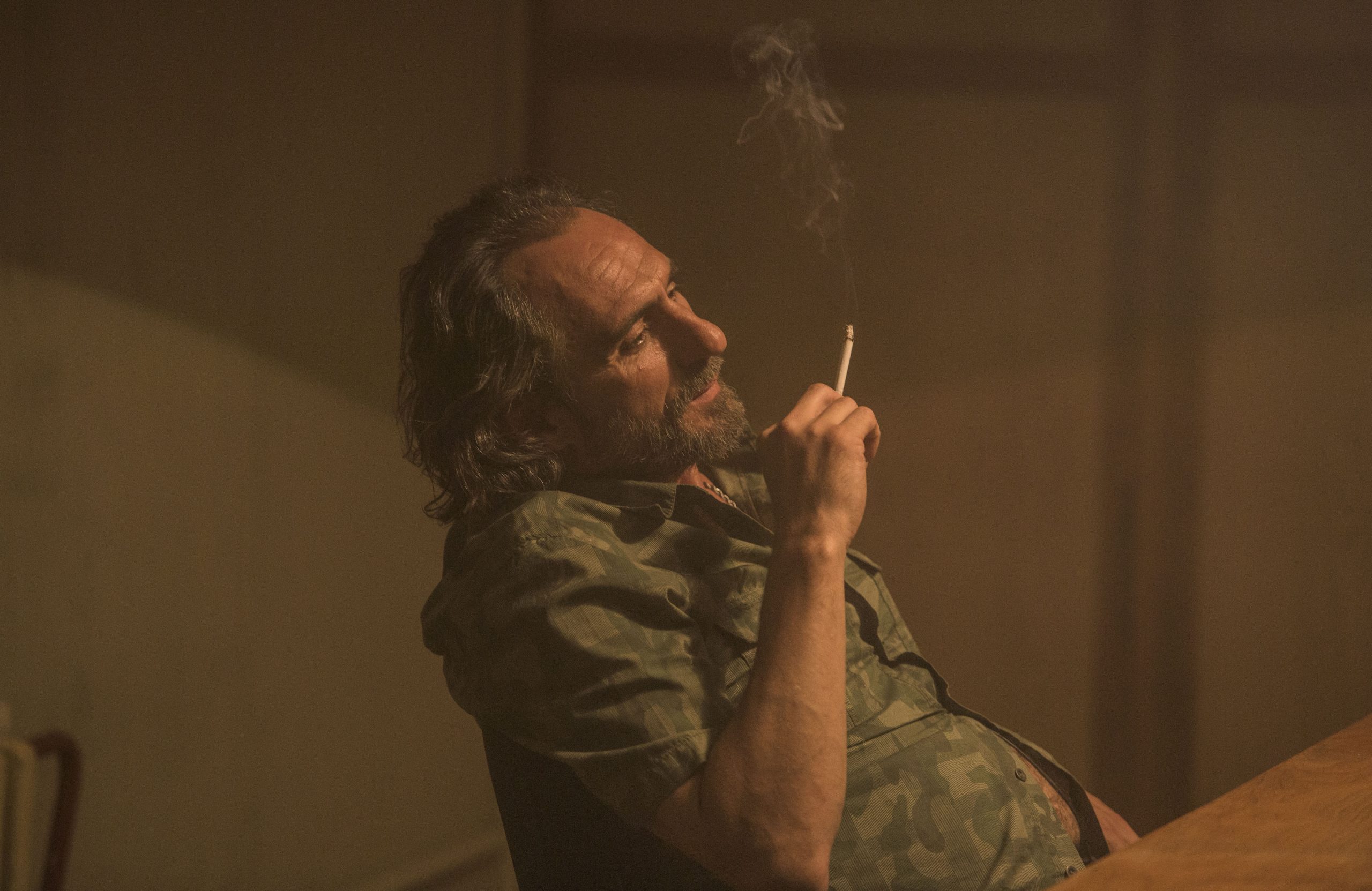
The production crew was faced with the difficulty of getting top Albanian actors like Mensur Safqiu to agree to play gangsters in a Serbian series. Photo: Aleksandar Letić.
Things aren’t going well for Uroš either. Interpol knows he’s been working for Dardan and the net is closing in, but he’s given a short reprieve when the Berishas manage to have the DNA evidence against Uroš destroyed before it can be analyzed.
With the destruction of the evidence against Uroš, Petrit sees Dardan slipping out of his grasp. When he’s approached by a Sokoli operative with shady evidence against Dardan, he appears ready to take advantage of it.
And just when Uroš thinks he’s committed his last murder for Dardan, he is informed in the final scene that he’s not done yet, he must kill Petrit.
***
The production team knew that without top Albanian actors the show would fail, so Bajraktaraj, as the most popular and recognizable Albanian actor internationally, was their top choice.
“The negotiations with Arben lasted for months and he didn’t want the role,” Korolija said, “he didn’t even want to read the script. He knew it was a Serbian show called Besa where we offered him a role of an Albanian drug lord and of course he didn’t want that. But I was really desperate.”
Eventually Korolija managed to get in contact with Bajraktaraj and she started sending him scripts episode by episode one evening. He read late into the night and by four in the morning had read everything they’d written so far. “And he asked me, ‘How many episodes do you have? Do you have more?’,” Korolija said, “And then I realized he was interested.”
“What surprised me was the dramaturgical arc. It was very well done, very well built,” Bajraktaraj said. “But the rest was full of shit. Literally propagandistic shit. Stupid Serbian cliches about Albanians and all that. Any Albanian would be horrified.
“So I was just going to say thank you, I loved the dramaturgical arc, I love the plot, but I can’t do it,” he said. “I prepared my answer but before sending it, Tea called me and said, ‘Please don’t send me the answer. Can we talk? Wherever you are, I’m gonna come.’”
Korolija hopped on the next plane to Paris, where they spent the whole day together. “Tea was completely open,” Bajraktaraj said, “so we entered into a second phase.”
Stoimenov was tasked with getting the writers’ room in line and reworking the script.
“You will never have any successful Serbian actor play in any kind of Albanian movie because they know they’d have to play some kind of war criminal,” he said. “Or there is no case that an Albanian actor from Kosovo will play in a Serbian movie because they know they’d have to play some kind of butcher or war criminal.”
This impulse was what he had to push back against. Some of the writers, Stoimenov said, “wanted to create these Albanian characters as war criminals. From the very beginning there were some awful ideas like the Dardan character would feed Serbs to his dogs.”
“It was not only fake, it was really stupid, some of it,” said Bajraktaraj of the first draft of the script he read. “I don’t have a problem playing a crime series, but I have a problem if it’s not truthful and if it’s full of ideological shit.
“So for me it was a tremendous challenge,” he said. “I could either turn it down, which is fair enough, or I’m going to enter into a fight, into a personal and artistic fight. Not with Serbs, but with the subject itself, with the stereotypes themselves.”
Though the show relies on the suspense, melodrama and surprises of classic crime series, “within the story line … there was something inside it very close to the old Greek tragedies,” Bajraktaraj said. “And perhaps that was the thing that kept me on. I was breathing with it.”
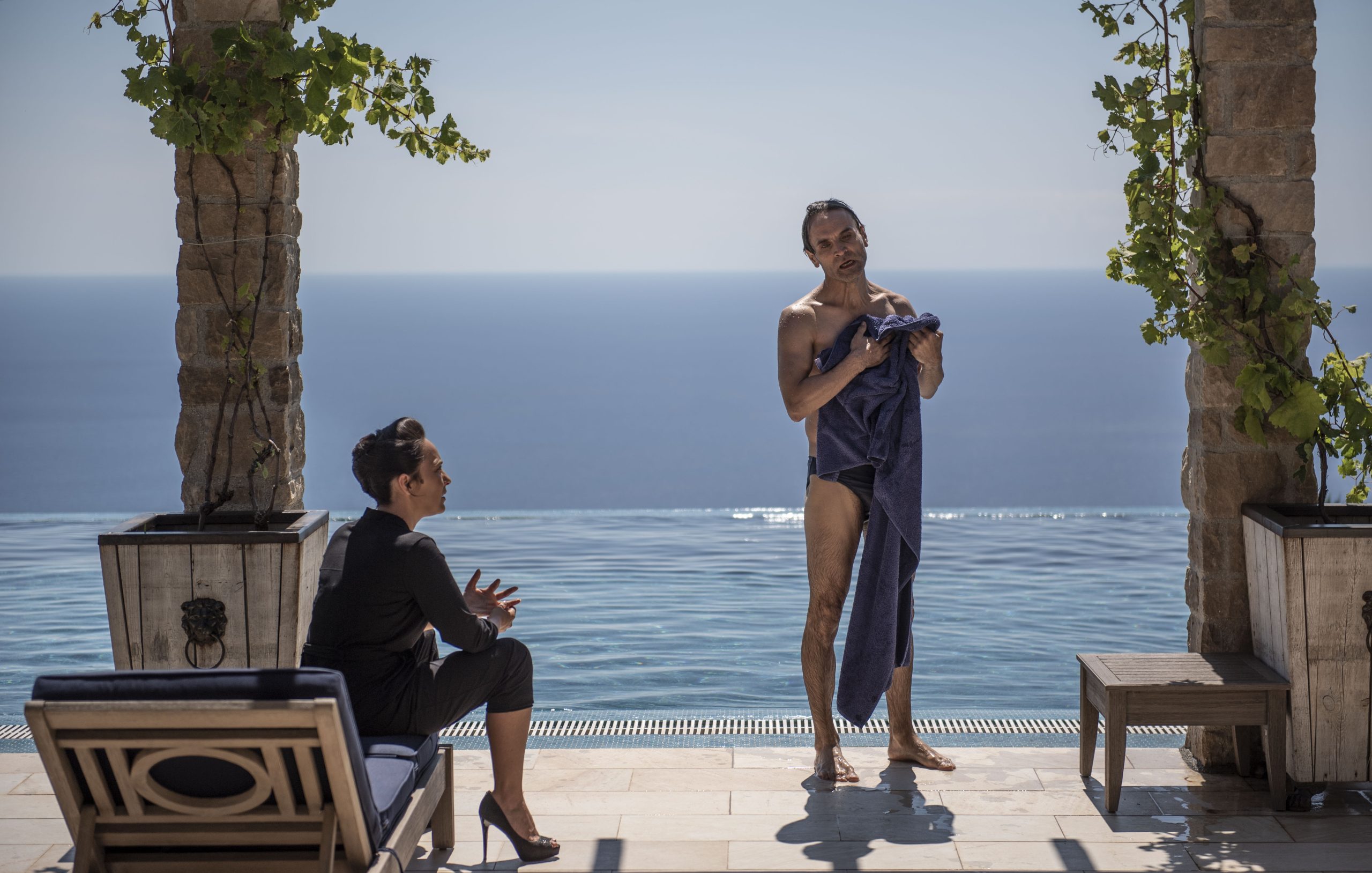
The show aims to rise above the level of an average crime series and takes inspiration from the Greek tragedies. Photo: Aleksandar Letić.
With the scripts scrubbed of what was most galling, they organized a casting call in Prishtina.
“That casting in Kosovo was big news,” Korolija said. “I think a lot of actors accepted the invitation just out of curiosity. Who is this production company from Serbia who is organizing a big casting for like 20 roles? But they were all very suspicious about us.”
Through long conversations and a lot of trust-building, they got top actors like Safqiu and Pallaska, but they had more difficulty convincing younger Albanian actors to sign on.
“We had problems from the very beginning with Albanian actors who agreed … and then they didn’t show up at the set because they were afraid to play Albanian gangsters in a Serbian show,” Stoimenov said, before Korolija interrupted. “Which is normal, it’s totally normal,” she said. “It was really tricky for them to accept the role in our show.”
Bajraktaraj noticed the same thing. “For the younger actors … it was different,” he said. “I think a few of them turned it down because they were not comfortable going to Belgrade, which is fair enough. But later on they came in.”
By the time the casting call went out for the second season, the show’s buzz was at a peak and everyone wanted in.
Refet Abazi, a veteran actor from Skopje and university professor of dramatic arts in Skopje and Tetovo, had a minor role in season one as Isa, an old-guard Berisha clan stalwart. By season two the character moved to center stage, as did Abazi’s position in the production crew, where he was a consultant for casting and Albanian dialogue.
“Igor or Tea mentioned in some interview that I was a consultant for casting Albanian actors,” Abazi said, “and now everyone is asking me, ‘When’s the next audition? When will there be a casting call?
“They’re sending me messages: ‘Don’t forget about me!’”
***
As one of the first serious attempts in Serbia or other post-Yugoslav states to create the type of prestige TV that has developed in the United States and western Europe over the past two decades, the show makes a bid for a new TV sub-genre: Balkan noir.
“Watch any Scandinavian series,” Stoimenov said. “Do you know whether this bridge, this killing, is it Danish, Swedish, Norwegian, Finnish? It’s just Scandinavian noir. That’s what we wanted to make, something that is just a Balkan series.”
Not content to be just a “Serbian series,” Besa implicitly points the way forward to future multilingual trans-Balkan series, stories and co-productions.
Bajraktaraj, consciously or not, leaned into the Balkan noir angle when crafting his character. “I didn’t want Dardan to be a copy of those big masters, [Marlon] Brando and [Al] Pacino and others,” he said. “I wanted him to be from karst mountains. Like people from my village. Like my cousins. Like me.” Balkan noir demands a Balkan criminal.
The hesitation of some Albanian actors to play such a criminal wasn’t only related to the fact that Besa is a Serbian production. While in the past Italians were the go-to ethnicity for organized criminals in film and TV, as in “The Godfather” or “The Sopranos,” in the last couple decades Hollywood films are more likely to have as villains Russians, or Bulgarians, or Serbians, or, increasingly, Albanians.
A question actors from these countries often face is whether it is appropriate to accept a role knowing that the end result will be a portrayal of their country as a den of criminals and pimps. It is a decision that is particularly challenging given that these roles are often the only ones actors from the region are offered and a refusal to accept such a cliche role just means someone else will fill it.
A number of the Albanian actors involved in Besa, including some who did not speak on the record, mentioned the classic mafia films of the 1970s and 1980s in reference to their own involvement in the Serbian show. Should Italian-American actors have turned down roles in these films?
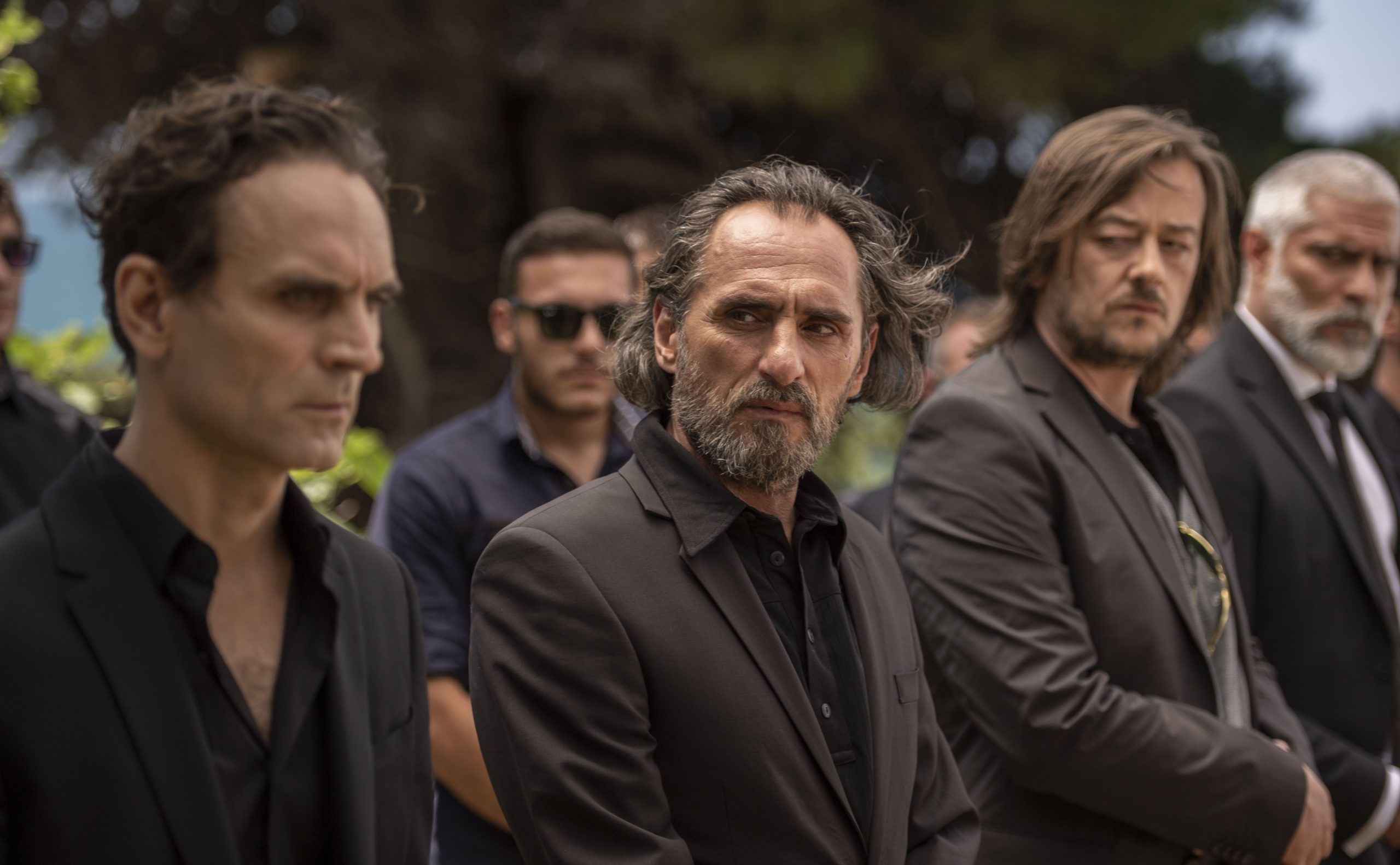
A number of the actors in Besa reflected on the classic mafia films of the 1970s and 1980s. Photo: Aleksandar Letić.
In the 2008 movie “Taken,” Bajraktaraj had his most famous role to date: Marko from Tropoja, a Parisian criminal from Albania who runs a sex slavery operation. Bajraktaraj played his role with such gut-churning intensity that although Marko isn’t onscreen for long, the performance has an outsized impact on the movie.
Though praise for his acting was unanimous, his role created debate among many Albanians. Because the film was a global blockbuster and particularly crude in its portrayal of Albanians as heartless criminals, some Albanians argued that it instilled the idea of Albanian criminality in the minds of a global audience.
Asked about his own decision to play an Albanian gangster in a Serbian series, Abazi recounted an experience from the late 1990s when he was one of the only Albanian actors to perform in the Macedonian-language theater in Skopje. He said that when a journalist asked him how he felt as an Albanian acting in the Macedonian language in the Macedonian theater, he said, “I am invited as an actor, not as an Albanian. I’m representing my profession. So I allow you to evaluate me only as a good or bad actor, not as a good or bad Albanian.”
Abazi continued, praising the performances of his fellow actors in Besa and noting in particular the challenges Kosovars have in playing criminals in a Serbian production. “They are brilliant actors, they have done a great job,” he said.
Nevertheless, Besa is still a Serbian show about Albanian criminals in which practically every Albanian character — man or woman, police officer or student — lives by blood oaths and is motivated by blood revenge. If the premise seems cliched or crudely conceived, that’s because it was.
In an interview at the Tuzla Film Festival, Stoimenov recounted the show’s conception. The plan was to come up with something that could be created at a high quality but relatively cheaply in the Balkans and then sold abroad. They came up with a list of concepts to share with Tony Jordan in London, “Tesla, vampires … pyramids in Bosnia, I don’t even remember myself what else I wrote,” Stoimenov said, “and then I put there, at the bottom [of the list], ‘Albanian mafia.’”
In the meeting with Jordan they went through the ideas. Seeing his reactions, they thought they didn’t have a chance, until, Stoimenov said, “there at the end, ‘Albania mafia.’”
“Eh! That’s it!” Stoimenov says Jordan cried out. “We have the Albanian mafia, all the world has an Albanian mafia. It used to be Italian mafia, Russian mafia, now it’s Albanian mafia.”
***
When the second season starts (spoilers ahead), years have passed. Dardan is in a Montenegrin prison, the Berisha clan is in decline and Ilir, Teuta’s nephew, has taken over the Sokoli clan. Uroš is in witness protection with his wife and son in Estonia, working as a sulky car mechanic.
But when a truck forces Uroš’s family off a bridge (again a car crash), his wife and son die and Uroš barely survives. Certain that Dardan broke his besa to leave the Perić family alone, Uroš turns into a nihilist psychopath bent on revenge.
Petrit though is doing well. Having locked up Dardan, he’s been promoted to Vienna, where he heads Interpol’s Southeast European operations and lives in a fancy apartment with his new wife. But when the Perić family is attacked, he’s pulled back into Berisha affairs, and is now willing to compromise any legal or moral codes to solve his Dardan problem once and for all.
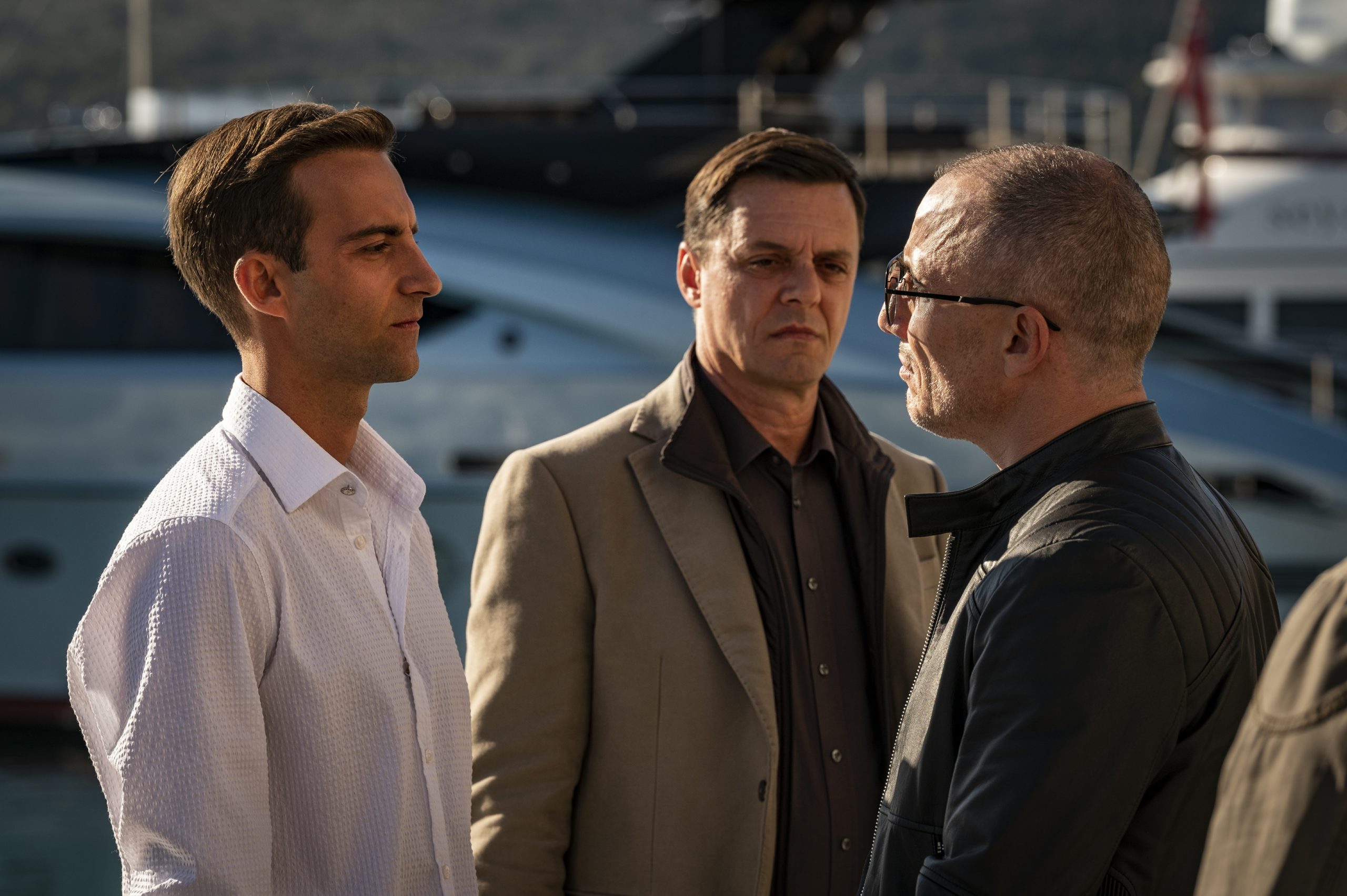
The second season is less about family and more about the struggle between generations. Photo: Sergej Radović.
Where the theme of season one is about the lengths people will go to save their family, the second season is about the battle between generations, between old and new.
In a presentation to his colleagues in episode one, Petrit lays it out. Drug trafficking is now “run by young players who know no limits neither state, religious nor national. Therefore we are no longer talking about Serbian, Albanian or Montenegrin mafia. From now on, we will use the term Balkan mafia,” he says. “Unlike the old fashioned criminals who had some kind of moral code, we are now dealing with young unscrupulous criminals with inflated egos.”
Though in the presentation he identifies Ilir Sokoli, played by Tristan Halilaj, as Interpol’s main target, the real unscrupulous criminal with an inflated ego is young Driton Berisha. Having spent the last few years in Italy, he decides it is time to return to the Balkans and take over the family business, against the wishes of his father.
Slowly, then suddenly, Driton takes the reins of the clan and fills it with young twitchy-eyed roughs out for blood and power. With his messy half-bun and his tie-dye shirts, Driton stands in sharp contrast to the heavy-set somber Berisha stalwarts of the older generation, who he slowly kills off.
This conflict between the opposing values of Driton and Dardan, and the generations they represent, is the dramatic engine of the season, particularly as it becomes clear one of them will have to die. “Tell me, am I a father, or am I the head of the clan?” Dardan asks Isa. Is his loyalty to his son, who’s trying to kill him, or to his position?
Late in the season, at a fatal moment, Isa emotionally tells Driton that he is the first Berisha to break a besa — it was Driton we’ve learned, not Dardan, who ordered Uroš and his family killed. “You know how much I don’t give a fuck about your old peoples’ shit?” Driton spits. “And I especially don’t give a shit about a besa given to a shkije [slur for Serbs] who killed my sister.”
The season ends with emotional cliffhangers. Petrit faces a devastating karmic response to his increasingly unhinged and illegal behavior and it’s unclear how he’ll respond. Dardan has escaped prison and retreated to a compound in Kosovo with some loyalists and is surprised when Uroš unexpectedly shows up. Though he’s been trying to kill Dardan all season, when Uroš discovers that Driton was responsible for the death of his family, he decides Dardan is besa-bound to kill his own son. “You gave a besa,” he cries. Is Dardan honor-bound to protect his insolent Oedipal son, or honor-bound to keep his word?
***
Though Besa is a show largely based on stereotypes about Albanians, the phenomenal acting of the Albanian cast and the novelty of hearing and seeing Albanian actors in such a high-budget TV show seem to have enabled Albanian audiences to embrace it. The show’s attempts at even-handedness helped too. There is no attempt to portray any nationality or nation as more or less immoral. Stoimenov has said the show has no good guys or bad guys, but it would be more fitting to simply say the show has no good guys — everyone is bad.
But as a show built upon stereotypes about Albanian criminality, traditionalism and “words of honor,” how does a Serbian audience receive Besa? Does the show manage to overcome the cliches or reinforce them?
In Abazi’s opinion, the show gives “the possibility as a viewer, from perhaps a very small Serbian town, to enter into [Dardan’s] family. You see his relations with his wife Teuta and, because of the brilliant performances by Gresa, we see how she suffers.
“You get connected emotionally with them,” he said, “because you share the same emotions.”
He mentioned in particular an online message he got from a Serb man in Banja Luka, who told Abazi how sorry he was that Isa had been killed. He wasn’t sorry for Abazi professionally, “he just thought Isa was a good man,” Abazi laughed. “That’s Besa!”
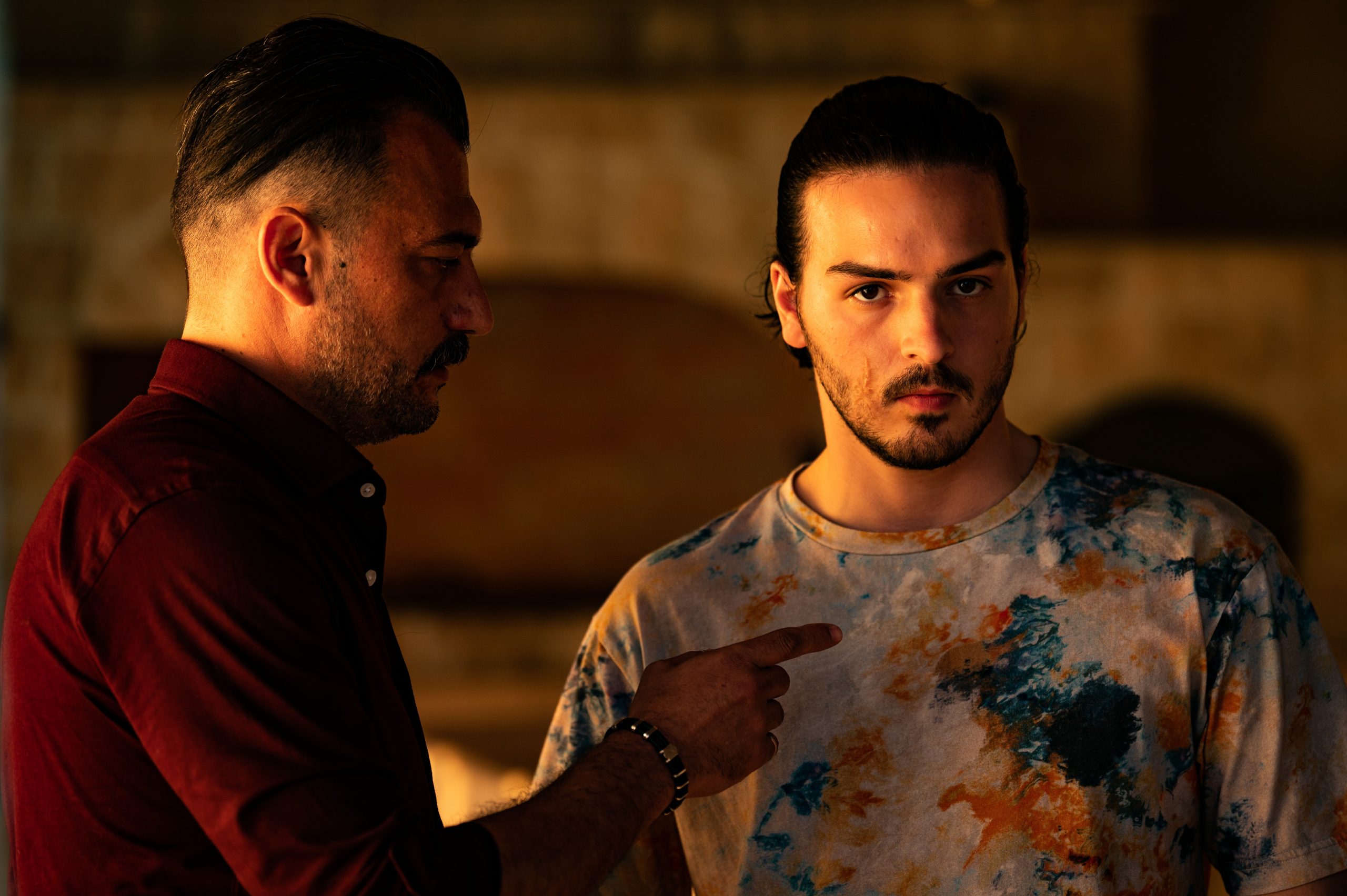
Driton Berisha is part of the new generation who doesn’t care about tradition and honor. Photo: Sergej Radović.
Stoimenov thinks there is something telling in the audience’s favorite characters. “Out of all the characters in Besa, you know, the audience loves Dardan the most. You know why that is? Because he is a traditional guy, he still thinks traditionally. That’s the way they connected to Teuta, to Gresa’s character too.” It’s not that they see the traditionalism of Dardan and Teuta as representing Albanians, rather, they see the Berishas’ code of honor, their emphasis on keeping their word and their willingness to sacrifice for their family as things they value in their own lives.
“Besa shows a parallel world,” Abazi said, “it shows some values that have been forgotten, and that hits people.”
Bajraktaraj was more circumspect about whether the show could overcome long-embedded prejudices but he saw positive signs in the audience’s response.
“Reinforcing stereotypes? I don’t know. I have so many letters, mostly written by women,” he said, “where they say precisely the contrary. For the first time they are looking at Albanians differently, and that was perhaps the essence of the challenge. How although there are stereotypes, what if I accept them and just give them back to you, so you can have your proper feeling of: Are they really like this?”
Early in the second season, when Petrit travels to Estonia after Uroš’s family is killed, an Estonian police officer asks what happened to Uroš back in the Balkans.
“He’s an ordinary man who notorious criminals turned into a beast,” Petrit says. He might as well have been talking about himself, or Dardan, or any number of characters in the show. In Besa, characters’ fates aren’t decided by the gods, as in Greek tragedy. By chance and by circumstance, they are forced into roles they must act out, often to their own doom.
“Uroš turned into a beast because, in a way, it’s also the story of the Balkans,” Bajraktaraj said, “the recent story of the Balkans. People becoming beasts, because of the background of what was happening. That’s perhaps why people are identifying themselves with the characters. We are touching on something beyond a simple crime series.”
***
In the last few years, films from the post-Yugoslav space have punched well above their weight-class. In 2022 the Kosovar film “Hive” made it onto the shortlist for the Oscars in the Best International Feature category, in 2021 the Bosnian film “Quo Vadis, Aida?” was nominated in the same category and in 2020 the Macedonian film Honeyland was nominated both for Best Documentary and Best International Feature. There’s no debate that the region has world-class actors, directors and cinematographers.
The question the series Besa implicitly asks is: “If our films can perform at a world-class level, why can’t our TV shows too?” There’s no reason why Balkan noir, if created with the creative and financial resources of a team of countries, can’t hit the highest levels of prestige TV and bring regional stories to global audiences.
Besa isn’t quite at the level yet. As one Serbian critic put it in an overall positive review of the series, viewers who are familiar with top-level prestige TV will “relatively quickly notice beginner’s steps, beginner’s flaws,” plot holes, minor script issues, continuity questions. On top of that, a viewer who doesn’t know better might assume after watching Besa that Albanians hand out two or three binding blood oaths before they get out of bed in the morning. But the series is a start.
“I really believe that this Balkan area, which is for all mainstream media in the West the worst area of Europe, is actually the perfect place for great stories,” Stoimenov said. “And these stories are not just Serbian, Albanian or Montenegrin stories. They are our stories.”
Though Hamiti had his doubts about Besa at first (it took two years before Klan Kosova agreed to purchase broadcast rights), in the end he concluded, “that art, no matter what the situation is, if things are treated in a decent way, can be shown in both Kosovo and Serbia.”
When thinking about Kosovo, Serbia, the Balkans and cinema, the great Yugoslav Albanian actors come to mind (the majority of the Albanian-language press coverage of Besa is clickbait articles asking whether Florist Bajgora is the new Bekim Fehmiu).
Near the end of our Zoom conversation, Bajraktaraj also reflected on their work. What would they think of Besa? “All those [Albanian] actors who were in Belgrade, it would be interesting to me to have their opinions, but now they’ve mostly died. Faruk, Bekim…” he trailed off. “But I think probably they would be happy. I don’t know about the series itself, that they would be happy with the subject matter, but they would be happy with the way it was received. I would like to believe that. At least we tried.”
Feature image: Arrita Katona / K2.0.


This article has been produced with the financial support of the “Balkan Trust for Democracy,” a project of the German Marshall Fund of the United States and the Norwegian Ministry of Foreign Affairs. Opinions expressed in this article do not necessarily represent those of the Norwegian Ministry of Foreign Affairs, the Balkan Trust for Democracy, the German Marshall Fund of the United States, or its partners.
Why do I see this disclaimer?










